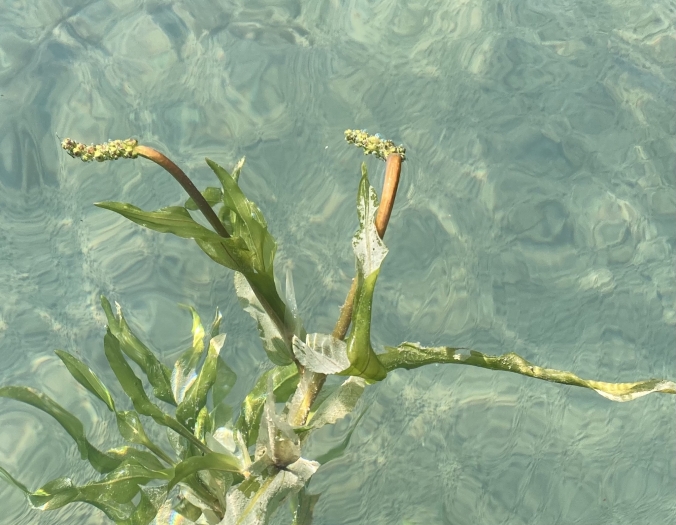Whitestem Pondweed
(Potamogeton praelongus)
Whitestem Pondweed (Potamogeton praelongus)
/
/

Caleb Catto
CC BY 4.0
Image By:
Caleb Catto
Recorded By:
Copyright:
CC BY 4.0
Copyright Notice:
Photo by: Caleb Catto | License Type: CC BY 4.0 | License URL: http://creativecommons.org/licenses/by/4.0/ | Rights Holder: Caleb Catto | Publisher: iNaturalist | Date Created: 2021-08-12T15:46:39Z |

























Estimated Native Range
Summary
Potamogeton praelongus, commonly known as whitestem pondweed, is a large, perennial aquatic herb native to clear, deep, alkaline lakes and slow-moving rivers in the Northern Hemisphere, including Europe, Asia, and North America. It often forms dense stands in its native habitat, providing shelter and food for aquatic wildlife. This species is particularly adapted to submersed life, with stout rhizomes anchoring it to the substrate and stems that can reach up to 10 feet in height. The leaves are transparent pale to deep green, and the stems exhibit a distinctive zig-zag pattern. Whitestem pondweed blooms in May-June, producing inconspicuous greenish flowers followed by large fruits.
In cultivation, whitestem pondweed is valued for its ability to oxygenate water and provide habitat for fish and other aquatic organisms. It is sometimes used in constructed wetlands or naturalized ponds for water purification purposes. This plant requires clear, deep, alkaline waters and does not tolerate eutrophication well, which can lead to its decline in polluted areas. While it is listed as Near Threatened in Britain due to nutrient pollution, it remains a key species in suitable aquatic ecosystems. Gardeners should be aware that it can become overly abundant under ideal conditions, potentially outcompeting other aquatic plants.CC BY-SA 4.0
In cultivation, whitestem pondweed is valued for its ability to oxygenate water and provide habitat for fish and other aquatic organisms. It is sometimes used in constructed wetlands or naturalized ponds for water purification purposes. This plant requires clear, deep, alkaline waters and does not tolerate eutrophication well, which can lead to its decline in polluted areas. While it is listed as Near Threatened in Britain due to nutrient pollution, it remains a key species in suitable aquatic ecosystems. Gardeners should be aware that it can become overly abundant under ideal conditions, potentially outcompeting other aquatic plants.CC BY-SA 4.0
Plant Description
- Plant Type: Herb
- Height: 2-6 feet
- Width: 1-3 feet
- Growth Rate: Rapid
- Flower Color: Green
- Flowering Season: Spring, Summer, Fall
- Leaf Retention: Deciduous
Growth Requirements
- Sun: Full Sun, Part Shade
- Water: High
- Drainage: Standing
Common Uses
Low Maintenance, Water Garden
Natural Habitat
Clear, deep, alkaline lakes and slow-moving rivers in the Northern Hemisphere
Other Names
Common Names: Whitestem pondweed
Scientific Names: , Potamogeton praelongus, Potamogeton acuminatus, Potamogeton flexicaulis, Potamogeton flexuosus, Potamogeton flexuosus, Potamogeton lucens, Potamogeton praelongus f. brevifolius (?elak.), Potamogeton praelongus f. curvatus, Potamogeton praelongus f. elegans
GBIF Accepted Name: